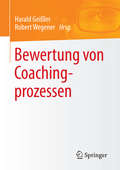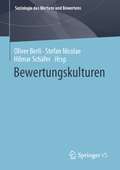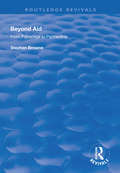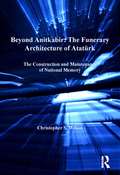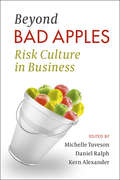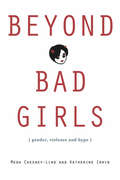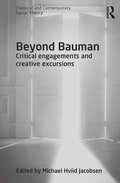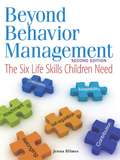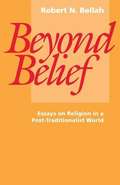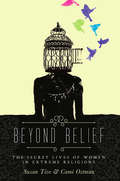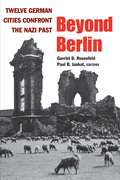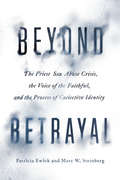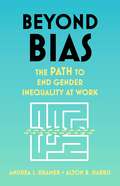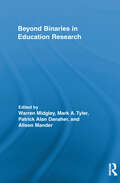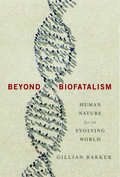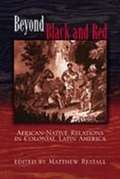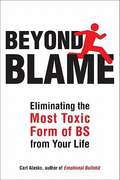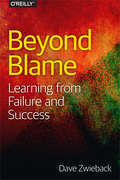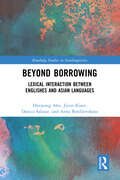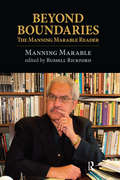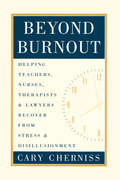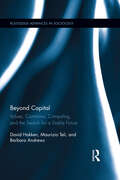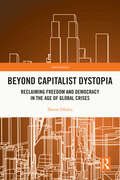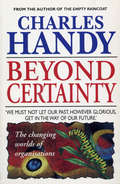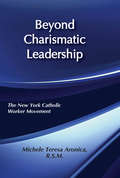- Table View
- List View
Bewertung von Coachingprozessen
by Robert Wegener Harald GeißlerDie Herausgeber dieses Buches haben eine Auswahl der renommiertesten Coaching-PraktikerInnen und Coaching-WissenschaftlerInnen versammelt, die, voneinander unabhängig, zwei - jeweils drei Sitzungen umfassende - Coachingprozesse analysieren und bewerten. In den einzelnen Beiträgen stellen die Expertinnen und Experten jeweils zunächst ihre Beurteilungskriterien vor, rekonstruieren dann die Problematik des von ihnen analysierten Coachings und nehmen abschließend in einem dritten und letzten Schritt ihre Bewertungen vor. Mit der Offenlegung der Praxis konkreter Bewertungsverfahren von CoachingpraktikerInnen und WissenschaftlerInnen leistet dieses Buch einen wichtigen Beitrag zur Frage nach der Bewertung von Coachingprozessen - ein bisher nahezu ,,weißer Fleck" auf der ,,Landkarte" des Coaching-Diskurses.
Bewertungskulturen (Soziologie des Wertens und Bewertens)
by Stefan Nicolae Oliver Berli Hilmar SchäferBewertungsphänomene wie Rankings und Ratings sind in Gegenwartsgesellschaften weit verbreitet. Sie werfen gleichermaßen theoretische wie politische Fragen auf und fordern die soziologische Analyse heraus. Der Band versammelt Studien zu Bewertungsphänomen in unterschiedlichen sozialen Sphären (u.a. Alltag, digitalen Medien, Kultur, Sport und Wissenschaft) und bringt sie miteinander ins Gespräch. Zugleich wirbt er für eine konsequent vergleichende Perspektive, die unterschiedliche Bewertungskulturen in Gegenwartsgesellschaften umfassend nachzeichnet.
Beyond Aid: From Patronage to Partnership (Routledge Revivals)
by Stephen BrowneFirst published in 1999, Browne creates a comprehensive assessment of post war development assistance in developing countries. Browne suggests that a better managed global environment, developing counties could further advance themselves and thus minimising then diminishing their need for aid resources.
Beyond Anitkabir: The Construction and Maintenance of National Memory
by Christopher S. WilsonThere have been five different settings that at one time or another have contained the dead body of Mustafa Kemal Atatürk, organizer of the Turkish War of Independence (1919-1923) and first president of the Republic of Turkey. Narrating the story of these different architectural constructions - the bedroom in Dolmabahçe Palace, Istanbul, where he died; a temporary catafalque in this same palace; his funeral stage in Turkey’s new capital Ankara; a temporary tomb in the Ankara Ethnographic Museum; and his permanent and monumental mausoleum in Ankara, known in Turkish as ’Anitkabir’ (Memorial Tomb) - this book also describes and interprets the movement of Atatürk’s body through the cities of Istanbul and Ankara and also the nation of Turkey to reach these destinations. It examines how each one of these locations - accidental, designed, temporary, permanent - has contributed in its own way to the construction of a Turkish national memory about Atatürk. Lastly, the two permanent constructions - the Dolmabahçe Palace bedroom and Anitkabir - have changed in many ways since their first appearance in order to maintain this national memory. These changes are exposed to reveal a dynamic, rather than dull, impression of funerary architecture.
Beyond Bad Apples: Risk Culture in Business
by Kern Alexander Daniel Ralph Michelle TuvesonThe one bad apple spoiling the whole barrel has become a common metaphor used with reference to risk culture in organisations. This “inside-out” perspective begins with the individual as the unit of analysis and follows with inferences to the broader environment. Since the Global Financial Crisis (GFC) of 2008, risk culture for many has become the explanation for shortcomings, poor decisions, and moral failures in organisations. This volume presents an institutional perspective of the forces that shape risk culture, and culture more generally, in organisations through a multi-disciplinary examination from a variety of leading academics and subject specialists. The authors demonstrate that firms play a role as manufacturers and managers of risk and they challenge common conceptions that attribute risk to chance circumstances or rogue behaviours. The foundational concepts needed for an institutional view of risk culture are highlighted with subsequent links to significant developments within society and firms.
Beyond Bad Girls: Gender, Violence and Hype
by Meda Chesney-Lind Katherine IrwinIn this important new work, two respected criminologists challenge the characterization of the new 'bad girl' arguing that it is only a new attempt to punish girls who are not the stereotypical depiction of good. Through interviews with young women, educators and people in the criminal justice system, Beyond Bad Girls exposes the formal and informal systems of socio-cultural control imposed on girls.
Beyond Bauman: Critical engagements and creative excursions (Classical and Contemporary Social Theory)
by Michael Hviid JacobsenBringing together leading interpreters of Zygmunt Bauman’s sociology, this volume thinks with and beyond Bauman’s work in order to show its continued relevance as a theory in its own right, as an object of criticism and as a stepping stone towards a fuller understanding of contemporary society. The volume deals with some proposed omissions and absences in Bauman’s sociology, with chapters comparing Bauman’s ideas to those of other prominent social thinkers as well as chapters devoted to teasing out some problems and pitfalls in his work. Paying attention to central concepts and themes of Bauman’s thought, authors engage with various aspects of his work, considering potential deficiencies in his ethical perspective, his neglect of the religious dimensions of modernity, his lack of consideration for ethnicity and gender, his overlooking the importance of socialisation in liquid modernity and his problematic argument for individual choice and freedom in a world that is increasingly closed down by consumer capitalism. Beyond Bauman aspires to show that despite Bauman's status as a key sociological thinker, there are also certain deficiencies in his work demand critical discussion. It will be of use to scholars of sociology, contemporary society, social theory and modernity.
Beyond Behavior Management
by Jenna BilmesWhy do children do the things they do? What can teachers do to manage it all? While there is not a simple method for understanding and managing all behaviors or all children, teachers can give young children the social and emotional tools needed to grow and thrive on their own. Developed and tested in the classroom, Beyond Behavior Management, is a strength-based approach to guiding and managing young children's behavior by helping them build and use essential life skills-attachment, collaboration, self-regulation, adaptability, contribution, and belonging-into the daily life of the early childhood classroom. As a result, children will learn to exhibit more pro-social behaviors, work better as a community, and become excited and active learners.This edition includes two new chapters and content reflecting early learning standards, new research, cultural diversity, and strategies to strengthen the home-school connection. Discussion and reflection questions, exercises, journal assignments, child profile templates, a planning worksheet, and sample scripts are also included.Jenna Bilmes is an early childhood consultant and an instructional designer for WestEd Child and Family Services. She is a frequent presenter to teachers, administrators, and counselors nationally and internationally.
Beyond Belief: Essays on Religion in a Post-Traditionalist World
by Robert N. BellahBeyond Belief collects fifteen celebrated, broadly ranging essays in which Robert Bellah interprets the interplay of religion and society in concrete contexts from Japan to the Middle East to the United States. First published in 1970, Beyond Belief is a classic in the field of sociology of religion.
Beyond Belief: The Secret Lives of Women in Extreme Religions
by Susan Tive Cami OstmanBeyond Belief addresses what happens when women of extreme religions decide to walk away. Editors Susan Tive (a former Orthodox Jew) and Cami Ostman (a de-converted fundamentalist born-again Christian) have compiled a collection of powerful personal stories written by women of varying ages, races, and religious backgrounds who share one commonality: they’ve all experienced and rejected extreme religions. Covering a wide range of religious communities—including Evangelical, Catholic, Jewish, Mormon, Muslim, Calvinist, Moonie, and Jehovah’s Witness—and containing contributions from authors like Julia Scheeres (Jesus Land), the stories in Beyond Belief reveal how these women became involved, what their lives were like, and why they came to the decision to eventually abandon their faiths. The authors shed a bright light on the rigid expectations and misogyny so often built into religious orthodoxy, yet they also explain the lure—why so many women are attracted to these lifestyles, what they find that’s beautiful about living a religious life, and why leaving can be not only very difficult but also bittersweet.
Beyond Berlin: Twelve German Cities Confront the Nazi Past
by Gavriel D. Rosenfeld Paul B. JaskotBeyond Berlin breaks new ground in the ongoing effort to understand how memorials, buildings, and other spaces have figured in Germany's confrontation with its Nazi past. The contributors challenge reigning views of Germany's postwar memory work by examining how specific urban centers apart from the nation's capital have wrestled with their respective Nazi legacies. A wide range of West and East German cities is profiled in the volume: prominent metropolises like Hamburg, dynamic regional centers like Dresden, gritty industrial cities like Wolfsburg, and idyllic rural towns like Quedlinburg. In employing historical, art historical, anthropological, and geographical methodologies to examine these and other important urban centers, the volume's case studies shed new light upon the complex ways in which the confrontation with the Nazi past has directly shaped the German urban landscape since the end of the Second World War.
Beyond Betrayal: The Priest Sex Abuse Crisis, the Voice of the Faithful, and the Process of Collective Identity
by Patricia Ewick Marc W. SteinbergIn 2002, the national spotlight fell on Boston’s archdiocese, where decades of rampant sexual misconduct from priests—and the church’s systematic cover-ups—were exposed by reporters from the Boston Globe. The sordid and tragic stories of abuse and secrecy led many to leave the church outright and others to rekindle their faith and deny any suggestions of institutional wrongdoing. But a number of Catholics vowed to find a middle ground between these two extremes: keeping their faith while simultaneously working to change the church for the better. Beyond Betrayal charts a nationwide identity shift through the story of one chapter of Voice of the Faithful (VOTF), an organization founded in the scandal’s aftermath. VOTF had three goals: helping survivors of abuse; supporting priests who were either innocent or took risky public stands against the wrongdoers; and pursuing a broad set of structural changes in the church. Patricia Ewick and Marc W. Steinberg follow two years in the life of one of the longest-lived and most active chapters of VOTF, whose thwarted early efforts at ecclesiastical reform led them to realize that before they could change the Catholic Church, they had to change themselves. The shaping of their collective identity is at the heart of Beyond Betrayal, an ethnographic portrait of how one group reimagined their place within an institutional order and forged new ideas of faith in the wake of widespread distrust.
Beyond Bias: How to Fix the System, Not the Symptoms, of Gender Inequality at Work
by Alton B. Harris Andrea S. KramerDespite extensive and costly diversity initiatives, little progress has been made in recent years in ending workplace gender inequality. Beyond Bias presents a compelling explanation of the reasons for this failure. Current diversity initiatives focus primarily on "teaching" people to be less biased and more inclusive. But this is the wrong focus. As Beyond Bias make clear, workplace gender inequality is a systemic problem caused largely by the (unintended) discriminatory operation of personnel systems, policies, and practices. Beyond Bias presents the four-prong PATH program for directly attacking this structural discrimination-and with it, individuals' discriminatory conduct:· Prioritize Elimination of Exclusionary Behavior· Adopt Bias-free Methods of Decision-Making· Treat Inequality in the Home as a Workplace Problem· Halt Unequal Performance Evaluations and Leadership Development Opportunities In the authors' characteristically clear and engaging style, Beyond Bias lays out a comprehensive set of actions that organizations can take to ensure women no longer encounter gendered obstacles to their career advancement and find their workplaces engaging, supportive places where they-and everyone-can thrive.
Beyond Binaries in Education Research (Routledge Research in Education)
by Patrick Alan Danaher Warren Midgley Mark A. Tyler Alison ManderBeyond Binaries in Education Research explores the ethical, methodological, and social justice issues relating to conceptualizations of binary opposites in education research, particularly where one side of the dualism is perceived to be positive and the other negative. In education research these may include ability-disability, academic-vocational, adult-child, formal-informal learning, male-female, research-practice, researcher-participant, sedentary-mobile, and West-East. Chapters in this book explore the resilience of binary constructions and present conceptual models for moving beyond them and/or reconceptualizing them to facilitate more productive approaches to education provision. With contributors from authors working in a multitude of educational fields and countries, this book provides a significant contribution to the ongoing challenge to seek new ways to move beyond binaries in education research.
Beyond Biofatalism: Human Nature for an Evolving World
by Gillian BarkerBeyond Biofatalism is a lively and penetrating response to the idea that evolutionary psychology reveals human beings to be incapable of building a more inclusive, cooperative, and egalitarian society. Considering the pressures of climate change, unsustainable population growth, increasing income inequality, and religious extremism, this attitude promises to stifle the creative action we require before we even try to meet these threats. Beyond Biofatalism provides the perspective we need to understand that better societies are not only possible but actively enabled by human nature. Gillian Barker appreciates the methods and findings of evolutionary psychologists, but she considers their work against a broader background to show human nature is surprisingly open to social change. Like other organisms, we possess an active plasticity that allows us to respond dramatically to certain kinds of environmental variation, and we engage in niche construction, modifying our environment to affect others and ourselves. Barker uses related research in social psychology, developmental biology, ecology, and economics to reinforce this view of evolved human nature, and philosophical exploration to reveal its broader implications. The result is an encouraging foundation on which to build better approaches to social, political, and other institutional changes that could enhance our well-being and chances for survival.
Beyond Black and Red: African-Native Relations in Colonial Latin America (Diálogos)
by Matthew Restall<p>Beyond Black and Red is the first book to deal primarily and specifically with relations between Africans and native peoples in colonial Latin America. Matthew Restall has collected nine essays that represent contributions to the larger fields of colonial Latin American history, African diaspora studies, and ethnohistory. Among the subjects addressed are marriage and miscegenation, identity and nomenclature, cultural exchanges, labor, and cooperation in resisting colonialism versus collaboration. <p>The authors examine core areas such as Mesoamerica, the Andes, and Brazil, and peripheral ones such as Florida, Colombia, and the Orinoco basin. The contributors find that relations between black and native peoples were sometimes harmonious, sometimes hostile, depending on local dynamics and individual agendas. Native and black soldiers fought sometimes as comrades, sometimes as adversaries, and couples in mixed marriages might identify as Indian or as black depending on where the advantage lay in a given society.</p>
Beyond Blame
by Carl AlaskoThe inspiring new book from the author of Emotional Bullshit reveals why no one is to blame-but everyone's accountable. For many, a rare day goes by in which the need to blame does not arise-be it to cover one's own errors or just to assign an unfortunate event some kind of name (i. e. , "If only X hadn't said X, we wouldn't be in this mess. ") And even for those who are somewhat better at keeping the impulse in check-it is still there. According to psychologist Carl Alasko, blame is such an intrinsic part of how we humans communicate that we rarely take a look at what we're actually doing-and how it can affect our relationships. In this book, Alasko reveals that the need to assign blame when something bad happens stems from a very deep desire we all share to "see justice done". Understandable when a grave crime has been committed, but it can become a dangerous habit if we begin to operate as though placing blame were somehow necessary if we want to change something or someone in our world. Yet this feeling that "someone has to pay" is seldom productive in initiating positive change. In Beyond Blame, Alasko teaches readers to recognize destruction that blame causes in their lives-oftentimes without their even being aware-and to put an end to it once and for all. The path to eliminating blame is not a quick or easy one but, as Carl Alasko demonstrates, it is a road that must be traveled if we hope to achieve true peace in our lives. .
Beyond Blame: Learning From Failure and Success
by Dave ZwiebackFailure is inevitable and a postmortem analysis, conducted in an open, blameless way, is the best way for IT techs and managers to learn from outages and near-misses. But when the "root cause" is determined to be "human error" (or worse, particular humans), the real causes and conditions are lost.In this insightful book, IT veteran Dave Zwieback shows you an approach for making postmortems blameless, so you can focus instead on addressing areas of fragility within systems and organizations. If you’re involved with assessing why something goes wrong on a project or at your company—as a system administrator, developer, team manager, or executive—the concrete steps in this guide will help you find a real solution that works.Recognize and mitigate the effects of stress during outagesLearn how to communicate effectively in a charged, high-stakes postmortem conversationCollect the necessary data before the postmortem beginsFocus on determining the actual causes and conditions of an outageLearn techniques for writing up a postmortem for either internal or external use
Beyond Borrowing: Lexical Interaction between Englishes and Asian Languages (Routledge Studies in Sociolinguistics)
by Jieun Kiaer Anna Bordilovskaya Hyejeong Ahn Danica SalazarIn their book, the authors describe the usage of and attitudes towards English in Asia since the 19th century, as well as the creative and dynamic ways in which Asians of the 21st century continually reinvent the lexicon of English, and the lexicons of their native tongues. The current biggest source of loanwords for many of the world’s languages is English, the once obscure Germanic language that has risen to the role of a global lingua franca. However, the overwhelming influence of English is far from being entirely one-sided, at least from a lexical perspective. Many have decried the way that English has "invaded" the vocabularies of their languages, without realizing that the English word stock is to some extent also being invaded by these languages. This book explores the phenomenon of word exchange by examining its occurrence between English and some of the major languages spoken in Asia-highly multi-ethnic, multicultural, and multilingual region where English is the predominant medium of international and intraregional communication. Students and researchers from various linguistic areas such as World Englishes, applied linguistics, sociolinguistics, lexicology, and contact linguistics will find this book appealing.
Beyond Boundaries: The Manning Marable Reader
by Manning Marable Russell RickfordManning Marable, historian and political scientist at Columbia University, has been a consistent voice challenging inequality and injustice in the social sciences for decades. Beyond Boundaries brings together Marable's best writing from the last two decades and will prove invaluable to anyone seeking to challenge race, class and gender inequalities today. A pioneering intellectual in the field of black studies and the founder of Columbia's Institute for Research in African-American Studies, Marable blends the disciplines of history, political science and sociology to address contemporary concerns and social issues.
Beyond Burnout: Helping Teachers, Nurses, Therapists and Lawyers Recover From Stress and Disillusionment
by Cary ChernissWhy are so many in the helping professions perceived as lacking idealism or commitment? Beyond Burnout, based on a unique, in-depth, longitudinal study, explores the source of this problem. Professionals describe in their own words what happened to them when their idealism collided with the realities of their work.
Beyond Capital: Values, Commons, Computing, and the Search for a Viable Future (Routledge Advances in Sociology #168)
by Barbara Andrews David Hakken Maurizio TeliThe financial/social cataclysm beginning in 2007 ended notions of a “great moderation” and the view that capitalism had overcome its systemic tendencies to crisis. The subsequent failure of contemporary social formations to address the causes of the crisis gives renewed impetus to better analysis in aid of the search for a better future. This book contributes to this search by reviving a broad discussion of what we humans might want a post-capitalist future to be like. It argues for a comparative anthropological critique of capital notions of value, thereby initiating the search for a new set of values, as well as identifying a number of selected computing practices that might evoke new values. It articulates a suggestive set of institutions that could support these new values, and formulates a group of measurement practices usable for evaluating the proposed institutions. The book is grounded in contemporary social science, political theory, and critical theory. It aims to leverage the possibility of alternative futures implied by some computing practices while avoiding hype and technological determinism, and uses these computing practices to explicate one possible way to think about the future.
Beyond Capitalist Dystopia: Reclaiming Freedom and Democracy in the Age of Global Crises (Antinomies)
by Davor DžaltoThis provocative book interrogates the ideology of capitalism as the "default" narrative underpinning various mainstream ideologies in the contemporary world. The book explores the genesis, structure and functioning of this ideological narrative, provides its critical assessment and outlines a possible alternative, beyond the logic of capitalism and toward a truly free and democratic society. The book takes a broad view of the major global challenges, including the COVID-19 pandemic, and persuasively argue that, in order to resolve any of the major global problems, from the ongoing ecological crisis to economic and geopolitical issues, we need to confront the capitalist system. To unpack the logic of contemporary capitalist ideology, and the way it structures our inter-personal and political relations, the book gives an analysis of the "end of ideology" narrative and offers a critical assessment of the ideas behind the widely used but fundamentally flawed concept of "Liberal democracy." The book revisits metaphysical foundations behind the ideology of capitalism, exposing their secular-religious dimension, and their immanent oppressiveness. Based on this deconstruction of the metaphysical foundations implicit in (Neo)Liberalism and capitalism, the book offers a way in which alternative metaphysical foundations can be constructed to allow for different socio-political and economic models that would be based on a radical affirmation of freedom and democracy, as well as human responsibility for the natural environment. Beyond Capitalist Dystopia: Reclaiming Freedom and Democracy in the Age of Global Crises will be of great interest to anyone searching for alternatives to the pervasive ideology of capitalism as well as students and researchers active in various fields in the humanities and social sciences.
Beyond Certainty: The Changing Worlds of Organisations
by Charles HandyOver the last decade, change has accelerated violently. The Thatcher/Regan years were a time of certainty, when greed was good, more meant better, and the Western world rejoiced to see George Orwell's dismal prophecy for 1984 confounded. But there is a curvilinear logic in the universe. Prosperity cannot last forever.Empires and organisations must flounder. The world must be reinvented. We can now be certain only of uncertainty, and to plan for the future we must think differently. Compromise may be the way forward, and organisations must give more freedom to individuals to preserve commitment and creativity.In this challenging and exhilarating collection of pieces, Charles Handy, Britain's foremost business guru, takes us on an intellectual journey through a changing world, in order to see how we must adapt to make our future work.
Beyond Charismatic Leadership: New York Catholic Women's Movement
by Michele Teresa Aronica R. S. M.Dorothy Day died recently in New York City. With her death, the Catholic Worker Movement lost the last of its founders and leaders. In this insightful and well-documented study, Aronica answers the question whether and how the Movement has survived beyond the founders. Starting from the notion of charismatic leadership, the author converts the Catholic Worker Movement into a test case for the classical analysis of social organization. Through participant observation, Aronica uncovers and explains the system of power and authority, the process of incorporation and the services provided to the poor by the Catholic Worker Movement. The Movement's paper, the Catholic Worker, was used to help provide a typology of membership categories. The book is more than a study in the transformation of charismatic leadership; it is also a study of the place of radical social thought within American Catholicism. Aronica shows the problems that the church structure has with grass-roots activities. She also illustrates the difficulty that a grass-roots organization has in transforming itself into a functioning bureaucracy. The book adds a new organizational dimension to the growing number of books on social movements. It is well suited for an audience interested in the sociology of religion and for those concerned with a fruitful application of modern ethnographic research to classical frameworks.
